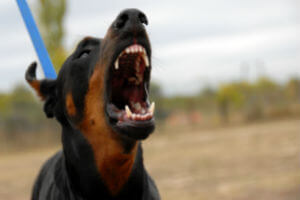 When a dog bites or injures a person in Wisconsin, there are specific laws that outline who is responsible for the incident.
When a dog bites or injures a person in Wisconsin, there are specific laws that outline who is responsible for the incident.
Dog Owner Liability
Wisconsin’s dog bite law hold a dog owner liable for all damages his or her dog causes to a person, another domesticated animal or livestock. The statute establishes a rule of strict liability, which allows a dog owner to be held liable even if he or she took reasonable care to restrain the dog and tried to prevent the attack.
If the owner knew that the dog had a history of biting people, the owner will be liable for twice the amount of total damages.
However, it is important to note that a victim can be partially liable for an attack if he or she was negligent leading up to the attack. This is called contributory negligence and may affect the amount of damages in your claim.
If the person is found to be more than 51 percent responsible for the dog attack, he or she cannot seek damages. This could include instances in which the victim provoked the dog.
If the victim is less than 51 percent liable for his or her injuries, the compensation awarded in the claim will be reduced by his or her percentage of fault.
An experienced dog bite lawyer can help you determine if you could be held partially liable for your injuries.
Applying Wisconsin’s Dog Bite Law
Wisconsin’s dog bite laws apply in all incidences in which a dog causes bodily harm, such as bites that puncture the skin or leave permanent physical damage and disfigurement.
The law also applies to situations in which a dog jumps onto a person and knocks him or her down. Even if the dog’s owner attempted to restrain it, he or she is still liable for the damage the dog causes.
The only exception to Wisconsin’s dog bite laws is extended to dogs used by law enforcement agencies, which are not liable if a dog injures a criminal suspect while performing its duty.
Statute of Limitations for Dog Bite Claims
Wisconsin has a three-year statute of limitations for injury claims concerning a dog bite or attack. The deadline begins on the date the injury occurred.
Those attempting to file a lawsuit against a dog’s owner must meet this deadline. If a claim is filed after the three-year limitation, it will be thrown out.
Criminal Liability for Dog Bites
Dog owners can face charges such as reckless endangerment or homicide for instances in which a dog causes serious injury or death.
Certain areas in Wisconsin also have breed restrictions for dogs and may impose criminal or civil penalties to the owner of a prohibited breed.
Criminal charges for dog attack cases differ from civil penalties in several ways. A civil claim for a dog attack is filed directly by the injured person, while criminal charges are filed by a prosecutor.
A civil claim also expresses liability for a dog attack in the terms of monetary compensation, while a criminal case would impose some form of punishment on the owner, such as imprisonment or fines.
Fines for Dog Attacks
The dog’s owner may be issued a fine between $50 and $2,500 if the dog injures a person, domestic animal or game animal.
If the dog injures another person or animal and the dog’s owner knew of a previous attack, he or she can be issued a fine between $200 and $5,000.
Punishment for Dogs with a History of Attacking Others
Wisconsin allows dogs to be euthanized if the animal has a history of aggression and causing harm to people or other domesticated animals.
Euthanizing a dog would require it to have caused serious injury while off the owner’s property on two or more occasions. The owner must have been aware of the first incident before the second occurred.
What Constitutes a Dog Bite or Attack in Wisconsin?
Wisconsin’s dog bite laws are about more than just bites that break the skin. Dogs can cause injuries in many ways, such as by:
- Jumping on someone and knocking them down may cause broken bones or head injuries.
- Scratching deeply with paws can leave scars or infections.
- Charging at someone and causing them to fall.
Dog bite laws focus on bodily harm, which includes any physical injury, illness, or impairment. If you were injured because of someone else’s dog, you may have a legal claim.
Strict Liability Under Wisconsin Dog Bite Laws
Wisconsin applies a strict liability standard to dog owners. This means:
- Owners are legally responsible for injuries their dogs cause, regardless of precautions they may have taken.
- The law does not require proof that the owner was negligent.
- Even if the dog was leashed, fenced, or previously gentle, the owner can still be held accountable.
Importantly, if the owner knew the dog had previously bitten a person, the damages owed to the victim can be doubled. This “double damages” rule is intended to deter owners from ignoring aggressive tendencies.
Who Can Be Held Liable for Dog Bite Injuries?
Dog owners are usually the ones held liable for dog bite injuries, but there are other parties that could bear some amount of liability.
For example, someone who is temporarily taking care of a dog, like a pet sitter, could be liable. Sometimes property managers or landlords can be found liable if they knew a tenant’s dog was dangerous and they failed to prevent an attack.
If a child owns or controls the dog, his or her parents could be held liable for failing to monitor their child and the dog.
The important thing for victims to remember is that dog bite liability could be complicated. That is why you need an experienced attorney to help you pursue compensation.
Contributory Negligence and Shared Fault
Wisconsin law recognizes that sometimes the victim’s own actions contribute to a dog bite incident. This concept, known as contributory negligence, can significantly affect the outcome of a claim. Under the state’s 51% bar rule, a victim can only recover compensation if they are found to be less than 51 percent at fault. If they are equally or more responsible than the dog’s owner, their claim will likely be dismissed.
For example, a person who provokes a dog by teasing, yelling at, or hitting it may share responsibility for the attack. Similarly, a victim who trespasses onto private property, ignores visible “Beware of Dog” signs, or attempts to approach an animal despite clear warnings may be found partially liable.
In situations where the victim is less than 51 percent responsible, compensation is still available, but it will be reduced by the percentage of fault assigned.
If a court finds the victim 25 percent responsible for provoking the animal, any award will be reduced by that same percentage.
Given this rule, it is vital for victims to document what happened and work with an attorney who can help demonstrate the dog owner’s primary liability.
Key Elements of a Dog Bite Claim in Wisconsin
To pursue a dog bite claim, certain elements must be established:
- Ownership or control – Proving who owned or was responsible for the dog at the time.
- Injury – Documenting physical harm such as bites, scarring, or broken bones.
- Causation – Showing the injury was directly caused by the dog.
- Damages – Medical expenses, lost wages, pain and suffering, and other losses.
Evidence that supports a claim includes medical records, photos of injuries, witness statements, and reports filed with local authorities.
What To Do Immediately After a Dog Bite
There are several steps you should take after a dog bite for your health and safety and to protect your potential legal claim.
- Seek medical care immediately to treat wounds and prevent infection.
- Report the incident to animal control or law enforcement.
- Take pictures of your injuries and the scene of the attack.
- Get the dog owner’s contact information for future reference.
- Get contact information for witnesses if there were any.
- Track your medical bills and how the injury impacts your daily life.
Compensation Available for Dog Bite Victims
There are several forms of compensation you may be able to pursue, including:
- Medical costs – ER visits, surgeries, medications, and rehabilitation
- Lost wages – Time missed from work due to recovery
- Pain and suffering – Physical and emotional distress
- Scarring or disfigurement damages – Particularly in cases involving visible injuries
- Emotional trauma – Counseling or therapy, especially for children
Each case is different, but damages can be significant, especially if the dog has a history of biting. PKSD is committed to recovering maximum compensation for dog bite victims, and we represent our clients at no upfront cost.
Possible Defenses Dog Owners May Raise
Dog owners rarely want to accept full responsibility after an attack. Instead, they may try to shift blame onto the victim or circumstances to avoid liability.
One of the most common defenses is provocation. If an owner claims the victim teased, struck, or frightened the animal, they may argue that the dog’s reaction was justified.
Another common defense is trespassing. If the victim was on private property without permission, the owner may argue that the victim should not be entitled to compensation.
In some cases, owners may also claim comparative negligence, suggesting that the victim’s behavior contributed to the injury. For instance, if a person approached a restrained dog without the owner’s consent, the owner might argue that the victim knowingly put themselves at risk.
Owners often claim the dog acted in defense of property or person. This defense is typically harder to prove but may be raised in cases where the dog was protecting its owner from a perceived threat.
Sometimes owners are simply trying to avoid responsibility, but sometimes these defenses have merit. In many cases, these defenses could reduce the owner’s liability, reducing the amount of compensation you receive. That’s why victims need strong legal representation to counter these claims and present clear evidence of the owner’s liability.
Preventing Dog Bites: Safety Tips for Owners and the Public
If you own a dog, there are many steps you can take to prevent the dog from attacking others, such as keeping the dog on a leash, bringing him or her around other people and dogs from an early age, and keeping your yard and fence secure.
When you are around a dog, you should always ask to pet the dog before doing so. Do not approach a strange dog you do not know, unless the owner is there. You also need to teach your children how to behave around dogs.
Important Updates or Changes to Wisconsin’s Dog Bite Law
Wisconsin’s core dog bite statute has remained consistent, but courts continue to interpret the law in cases involving strict liability and contributory negligence. Dog owners should stay aware of:
- Local ordinances that restrict certain breeds.
- Updated municipal rules on confinement and leash requirements.
When to Contact a Wisconsin Dog Bite Lawyer
You should strongly consider contacting a lawyer if the injuries are severe. For instance, if you have permanent scarring or an infection. Dog bites that leave visible disfigurement oon the hands, face or arms often lead to long-term physical and emotional consequences.
You should definitely talk to a lawyer if your child was injured by a dog. Children are more vulnerable to attacks, and their claims may involve unique considerations, such as long-term trauma and growth-related medical issues.
Contacting an attorney is also a good idea if liability is being disputed. Owners and insurance companies may argue that the victim provoked the dog or that they were trespassing. They may even deny the dog caused the injuries altogether.
An experienced attorney can investigate the facts, gather medical and witness evidence, and ensure the victim’s story is clearly presented.
If you are contacted by an insurance company offering a quick settlement, you should discuss the settlement with a lawyer before signing it. Early offers are often far lower than what victims deserve. An attorney can evaluate the full extent of damages, including future medical care, lost wages, and emotional suffering.
PKSD attorneys are experienced litigators who are prepared to go to court to recover the full compensation victims need. We have secured millions for our clients.
Experienced Dog Bite Lawyers in Milwaukee
Aggressive dogs that have a history of attacking people and other animals can leave victims with serious injuries and bodily disfigurement. Owners who neglect to restrain or separate a dangerous dog from the public should be held liable for the damage caused by the animal.
If you or someone you love has been injured by an aggressive dog, you will need an attorney with experience representing dog bite victims.
At PKSD, our attorneys work as a team to protect the rights of injury victims who were harmed because of another’s negligence. We can help you take legal action against a negligent dog owner and recover the compensation you deserve for your injury.
We only charge for our services if we recover damages on your behalf. Do not hesitate to contact us today for a free initial consultation to discuss your claim.
Call 414-333-3333 or complete our Free Case Evaluation form to get started now.



